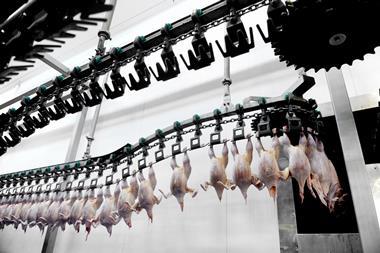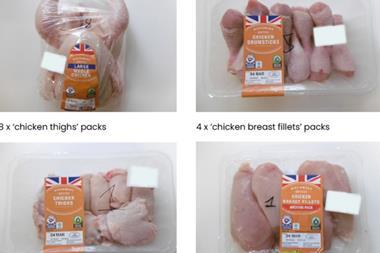
Chicken suppliers face losses of over £75m, plus the wastage of thousands of tonnes of meat, under new FSA plans to reclassify wishbone meat as mechanically separated meat, processors have warned.
The move follows an FSA consultation to change guidance over what constitutes MSM, which itself followed a 2019 Supreme Court ruling that determined three key criteria for the classification of MSM – one of which was the use of methods of mechanical separation to recover meat from bones.
While wishbone meat is sourced in this manner it had been been classified since 2004 as a ‘meat preparation’ instead. It is commonly minced and widely used in breaded chicken products.
The FSA’s proposals to adopt the ruling’s criteria was described as an “excessively broad interpretation of this judgement”, according to the British Poultry Council. Wishbone meat was “good quality meat”, the BPC said. And as a result, it was “overreaching its mission to ‘protect the interests of consumers in relation to food’”.
Reclassifying it as MSM would render it effectively “valueless”, it added, due to there being no market for the product in the UK.
The overall cost to the sector was estimated to exceed £75m, of which about £69m would be annual costs.
This was made up of £19m in annual direct losses of value to the sector, £50m each year to replace the product’s share of the market and £7.5m in one-off product reformulation and relabelling costs.
Up to 10,000 tonnes of meat could also go to waste each year if no overseas market could be found for the meat, it added.
Given the need to maximise the value of each carcase to continue delivering affordable chicken, then change in guidance would ultimately have to be borne by the consumer via higher retail prices, said BPC CEO Richard Griffiths.
“Pushing for a £75m increase in food prices reflects a lack of alignment between the FSA’s actions and professed commitments to food security and affordability,” he suggested.
“This raises serious questions about the FSA’s understanding of the implications of their role in ensuring our national food security, leaving households and producers to shoulder the cost and burden.”
The FSA declined to comment directly on the BPC’s concerns this week, pointing to a statement published at the start of the consultation in February.
“We are consulting stakeholders on the new guidance following the court ruling on MSM. We understand that this ruling will impact businesses, so it is right that we seek views from consumers and industry, on the guidance to maximise its effectiveness,” said Rebecca Sudworth, director of Policy at the FSA.
“We’re doing this to ensure that businesses have extensive opportunities to feed in. It is the responsibility of food businesses to ensure they comply with food law, and the FSA has made a commitment to develop new guidance on MSM to aid understanding following the court judgments,” she added.
“We’ll publish the outcome of the consultation, the impact assessment and the next steps to ensure that businesses and consumers are aware of the developments.”
The consultation closed for submissions this week.



















No comments yet